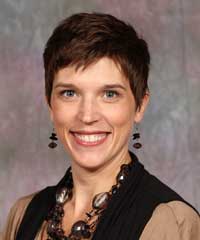From Words to Deeds: Creating Collaborative Communities
About the 2022-23 public affairs theme
Previous public affairs themes have encouraged us to find the power of our voices to bridge what can seem like ever-deepening divides. This year, we take an important next step: in a world where words are not enough, how do we move toward meaningful action in our communities? For the most complicated problems, answers arise from multiple voices. We must find ways to reach across disciplinary and professional fields of knowledge to listen to a wide variety of people interested in and affected by the challenges that our world faces today.
Innovators know this implicitly. Drawing on skills and expertise from a variety of perspectives, educators, health care workers, business owners and entrepreneurs, artists, writers, scientists, and activists are already at work creating collaborative communities locally, regionally, and nationally. Missouri State University’s 2022-2023 public affairs theme invites us to learn from and honor those collaborative thinkers. Specifically, the conference brings together experts from academia, non-profits, education, business, industry, arts, science, and agriculture to explore how collaboration makes better communities and how, with the tools of collaboration, we each may make a meaningful difference in the world.
Collaboration among various thinkers can illuminate even the biggest challenges:
-
Knowledge. What is needed to encourage interdisciplinary research and meaningful intellectual work between individuals, disciplines, college, and universities? What opportunities exist for collaboration between academic and private, public, or nonprofit sectors?
-
The natural world. What will it take to make the planet more sustainable? How can the work of scientists be meaningfully integrated with problems of population, poverty, health, and consumerism?
-
Public Health. How might rigorously professionalized fields like health care work mutually with humanities, arts, design, history, and philosophy, or from richly collaborative engagement with the public, to improve public health? What questions in medicine – of trust, access, or bias – need the input from other perspectives?
-
Beauty and inclusivity. What do design, storytelling, performance, and other forms of artistic creation contribute to each of these issues and more? What interdisciplinary challenge do the arts themselves face in a world with evolving attitudes toward history, technology, economic inequality, social justice, disability rights and more?
-
Hunger. Is it possible to feed the world? What kinds of innovative thinking – from food production to economics to urban planning to national security – would be necessary to solve the problem of hunger, both at home and abroad?
-
Economic growth. Can we balance encouraging local businesses with expanding global markets? What generative relationships do entrepreneurs and business owners need to adapt to specific challenges, like climate change, technological advancements, and immigration patterns and laws?
-
Social change. Who needs to be involved in conversations about race and history, so that we can work toward healing, rather than dividing the community? How has collaboration shaped movements for racial justice, disability rights and gender equality in the past, and what can we learn from those histories that we need now?
-
Criminal justice. How do we create a criminal justice system that is both effective and fair, maintaining public safety without discrimination? Whose perspectives are needed in problem-solving conversations about crime, law enforcement, and the judicial system?
-
Sustainability. Which of the challenges forced by COVID-19 should be sustained? What new methods of healing, learning, communicating, collaborating, performing, and doing business are worth keeping?
Theme logo was designed by Kasey Ewers, a senior at Missouri State University.
Join the conversation September 20-22, 2022
This year's Public Affairs Conference will be held September 20-22, 2022. Free and open to the public, programming will incorporate both in-person events and live, virtual programming.
View the members of the 2022 Conference Advisory Committee.
2022-2023 Provost Fellow for Public Affairs
